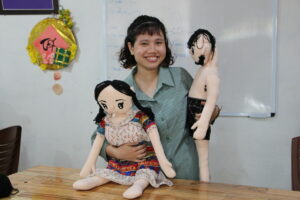
Body Talk: Empowering Disabled Youth for SRHR
By Liliane Fonds

Discussing sex with your parents or caregivers isn’t exactly a topic most people look forward to. Most of us can remember the awkward “talk” we had with our parent(s) or that 1 hour of sex education in high school. What’s even more concerning, though, is avoiding that conversation altogether. For most young people with a disability, sexuality and relationships can be difficult experiences and their needs and desires are often overlooked. The Body Talk program by Liliane Fonds, in collaboration with Rutgers, addresses this issue by informing disabled youth about their sexual and reproductive health and rights. Empowering people with disabilities, so they can make their own informed decisions.
Disabled youth frequently struggle to find trustworthy resources for getting information on sexual and reproductive health.
A difficult subject to broach
Disabled youth frequently struggle to find trustworthy resources for getting information on sexual and reproductive health. At home, parents and caregivers do not want, or know how, to talk about the subject. In schools, there is hardly any attention for sex education in general. Healthcare providers typically do not learn how to support young people with disabilities in their sexual development. Organisations working on sexual and reproductive health and rights often overlook persons with a disability, whereas disability organisations pay little attention to addressing sexuality in their services and support. As a result, people who should empower young people with disabilities, consciously or unconsciously, deny them the essential right to sexual and reproductive health.
Body Talk strives to empower young people with disabilities by fostering an understanding of their sexual and reproductive rights, enabling them to stand up for those rights and make informed decisions concerning their well-being.
Shifting behaviour, open minds
We need a shift in behaviour, in mindsets, recognising that people with disabilities too, have the right to sexual and reproductive health. You need communication skills that are both inclusive of people with disabilities as well as sex-positive and rights-based towards sexual and reproductive health. You need to know the current needs, attitudes, skills and practices around SRHR for people with disabilities and anticipate on that. You need common values defined to reach the common goal. The Body Talk Program has it all.
We need a shift in behaviour, in mindsets, recognizing that people with disabilities too have the right to sexual and reproductive health.
Holistic approach: sexual development is an integral part of life
This affects a large group of people, worldwide, about one billion people have a disability, that is 15% of the world population. 80% of these individuals live in developing countries, and 20% is between 10 and 25 years old. In Body Talks, the strategy to tackle the complexity of the problem, is to adopt a holistic and multisectoral approach. Sexual development is an integral part of life and thus should be an integral part of the support to children and young people with a disability. In order to do so, SRHR is integrated into the support and counselling stakeholders that are involved in the lives of people with a disability and their families. We are not only targeting young people with disabilities themselves. Healthcare providers, teachers, parents, caregivers, community leaders and community-based rehabilitation workers have a role to play too. The Body Talk program has developed a training guideline for the target groups mentioned above.
Liliane Fonds works together with Rutgers. Their expertise on SRHR, combined with our expertise on young people with disabilities and both our networks, make it possible to meaningfully include persons with a disability and make the information accessible to them. We work together with local partners in Indonesia (NLR), Vietnam (Research Center for Inclusion), and the Philippines (Norfil) to understand how SRHR and disability inclusion can be embedded in the local context whilst considering local customs and policies.